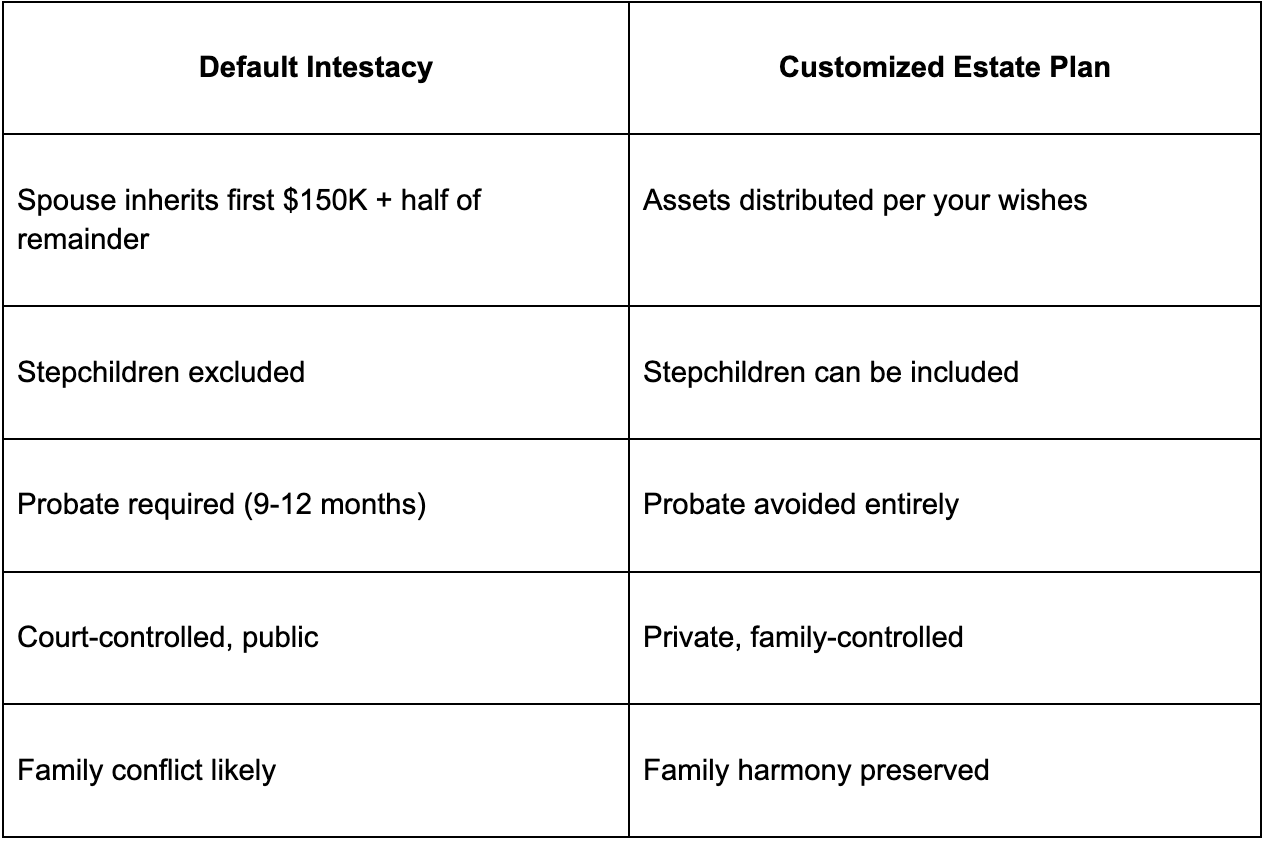Date:
November 3, 2025
Author:
Anastasia Fainberg
/
Founder & Managing Partner
Colorado Law Doesn’t Always Match Family Reality
Most parents assume their children will automatically inherit what’s left behind. It feels natural, you work hard, raise your kids, and imagine your savings will one day help them build their own lives.
But under Colorado law, that’s not always what happens.
When a parent in a blended family passes without a trust or comprehensive estate plan, the law gives priority to the surviving spouse, not the children. Children from a first marriage can be unintentionally disinherited. Stepchildren, no matter how loved, have no inheritance rights unless legally adopted.
The result can be heartbreaking. Family homes sold to pay off new expenses. Step-siblings suddenly at odds. Promises broken not by intent, but by inaction.
In this article, we’ll walk through how Colorado’s intestacy laws work, why they’re risky for blended families, and how thoughtful planning can ensure your love, not the law, decides who inherits what.
Why Blended Families Face Unique Legal Risks
Blended families are now the norm in Colorado. With remarriage rates high and multi-household families common, nearly one in three Colorado homes today includes stepchildren or children from previous relationships.
Yet the intestacy statutes, the default inheritance rules when no plan exists, were written for a traditional family structure: one marriage, one set of children, one estate.
That mismatch leads to painful outcomes.
- The surviving spouse often inherits the first $150,000 of the estate plus half of everything else.
- Children from a first marriage split whatever remains, sometimes very little.
- Stepchildren receive nothing unless formally adopted.
- Probate courts cannot “make it fair.” They must follow the statute exactly as written.
Pro Tip: Learn more about how intestacy works at Denver Will Attorney.
This is why blended-family planning isn’t just a legal issue, it’s an act of protection. Without clear, written instructions, the people you love most may end up on opposite sides of the courtroom.
Case Study: Mark and Elena (Second Marriage, Two Families)
Mark, a Denver engineer, remarried after his wife passed away. His new spouse, Elena, had one teenage daughter; Mark had two grown sons. They never updated their estate plans.
When Mark died unexpectedly, his estate, worth about $700,000, fell under Colorado’s default rules. Elena inherited $150,000 plus half of what remained. The rest was split between Mark’s sons. But most of the assets were tied up in their jointly titled home and retirement accounts listing Elena as beneficiary.
By the time probate ended, the sons received nothing. The house and accounts all transferred to Elena automatically.
No one acted with bad intent, the law simply worked as written.
Learn more about preventing this scenario at Trust Attorney Denver.

How Colorado’s Default Rules Divide an Estate
Colorado’s intestacy framework (C.R.S. Title 15) sets inheritance shares based on family composition:
- If all children are from the current marriage: The surviving spouse inherits everything.
- If there are children from a prior relationship: The surviving spouse inherits $150,000 plus half of the rest. The children share the remainder.
- If only stepchildren survive: Stepchildren inherit nothing unless adopted.
- If there is no spouse: All biological or adopted children inherit equally.
Example in Action
Imagine a parent with $600,000 in assets and two children from a first marriage. After remarrying, the parent dies without a trust or will.
- The new spouse receives $150,000 plus half of the remaining $450,000 ($225,000) = $375,000 total.
- The children split $225,000, or $112,500 each.
- If major assets like a home or retirement account are jointly titled or have a spouse listed as beneficiary, the children may receive nothing.
That’s the silent risk: designations override wills, and intestacy ignores verbal promises.
Stepchildren and the “Invisible Heirs” Problem
Colorado does not recognize stepchildren as heirs unless they are legally adopted. That means:
- Even if a parent raised a stepchild for 20 years, they have no automatic rights to inherit.
- Probate courts cannot “treat them like family.”
- Only written, legally enforceable documents can include them.
Families often assume “everyone knows what Mom wanted.” But in probate court, intent doesn’t count, paperwork does.
The Elective Share: Why Even a Will May Not Protect Children
Many people assume writing a will solves everything. In blended families, that’s rarely true.
Colorado’s elective share law allows a surviving spouse to claim up to half of the estate, depending on the length of the marriage, even if the will says otherwise.
So if a parent tries to leave most assets to children from a prior relationship, the new spouse can legally override that decision.
The purpose of the elective share is fairness, but in blended families, it often produces the opposite.
Probate: Where Conflict Becomes Cost
Even when everyone agrees, probate in Denver can take 9-12 months. During that time:
- Assets are tied up under court supervision.
- The personal representative (often the spouse) controls decisions.
- Children from previous marriages may feel shut out or suspicious.
- Legal fees, court costs, and appraisals can consume 5-10% of the estate’s value.
And because probate is public, anyone can see what assets were owned and who inherits.
Grief and money rarely mix well. Families already hurting from loss can find themselves in emotional and financial turmoil that planning could have prevented.
Case Study: “The Cabin That Caused a Rift”
A Colorado Springs mother passed away leaving a mountain cabin she wanted her three children to share. Her second husband assumed he could sell it and use the proceeds for his retirement.
Under intestacy, he received $150,000 plus half the remainder. The children shared the rest. But since the cabin was jointly titled, it transferred entirely to him outside probate.
He sold it six months later. The children, who grew up there, were devastated. They couldn’t contest it.
This isn’t rare. It’s what happens every week in probate court.
The Reality: “No Plan” Means the State Has One
When someone dies without a trust or will, Colorado’s intestacy laws act like a government-written estate plan. It applies instantly, and impersonally.
Side-by-Side: Default Law vs. Custom Plan

Common Misconceptions
Myth #1: “My spouse will take care of the kids.”
Not always. Once assets transfer to the surviving spouse, they legally belong to that person. There’s no obligation to share them later with stepchildren or prior children.
Myth #2: “A will avoids probate.”
It doesn’t. A will must go through the probate court to be validated and executed. Only a trust can keep assets out of court.
Myth #3: “We already agreed on everything.”
Verbal promises carry no legal weight. Without documentation, those agreements can be ignored.
Myth #4: “We don’t have enough money to worry about this.”
Even a modest Denver home often exceeds $500,000 in value. That’s more than enough to trigger complex probate and inheritance issues.
Myth #5: “My stepkids will understand.”
Maybe emotionally, but not legally. Stepchildren have zero rights unless included in a valid estate plan.

Why This Really Matters
Estate planning isn’t just about documents, it’s about dignity and fairness.
Your legacy is more than numbers; it’s the story of your family, the sacrifices you’ve made, and the people you love most.
Without a clear plan, the law decides, and it rarely reflects the heart behind your intentions.
With the right plan, you decide:
- Who inherits your home.
- Who manages your estate.
- Who stays protected when life changes.
That’s not control, that’s care.
As Anastasia Fainberg - our Founder and Principal Attorney - often says, “It’s not about money. It’s about the people you love.”
How to Start
Creating a blended-family plan doesn’t need to be overwhelming. Start simple:
- Review your current documents. If your will or trust predates your remarriage, update it.
- List every asset. Include homes, retirement accounts, life insurance, and joint titles.
- Check your beneficiary designations. They override wills, make sure they match your intentions.
- Consider a blended-family trust. It can balance protection for your spouse and security for your children.
- Work with an experienced Colorado estate planning attorney. Laws vary by state, and blended families require careful customization.
- Revisit regularly. Life changes, marriages, births, divorces, all shift your legal picture.
Pro Tip: Legacy Law’s Client Care Program includes annual reviews to keep your plan current.
FAQs
Do I need a trust if I already have a will?
Yes. A will must go through probate, while a trust allows assets to pass privately and efficiently.
Can my stepchildren inherit if I don’t adopt them?
Not automatically. You must name them in your trust or will to include them.
What is the elective share, and can it be waived?
It’s the portion of an estate a surviving spouse can claim regardless of the will. It can be waived in a valid prenup or postnuptial agreement.
What happens if we own the house jointly?
With “joint tenancy with right of survivorship,” the house passes directly to the surviving owner, even if your will says otherwise.
Can my spouse change the plan after I die?
Yes, unless assets are placed in a trust that becomes irrevocable at your death.
How long does Colorado probate take?
Simple estates average 9-12 months. Contested cases can last years.
What about retirement accounts and life insurance?
They follow beneficiary designations, not your will or trust, unless the trust is listed as beneficiary.
Can I leave property to my spouse for life, then to my kids?
Yes. A “marital trust” or “QTIP trust” can support your spouse while reserving the remainder for your children.
How often should I update my plan?
Every 3-5 years, or after any major life change such as marriage, divorce, move, or significant purchase.
What makes Legacy Law different?
We design living, adaptable plans that evolve as your family does, supported by ongoing reviews through our Client Care Program and holistic LIFT (Legal, Insurance, Financial, Tax) approach.
Closing Reflection
In blended families, love can be beautifully complex, but the law is not. Colorado’s default rules don’t understand second marriages, stepchildren, or promises made around kitchen tables.
Planning bridges that gap.
At Legacy Law Group Colorado, we help parents and spouses write their own rules, ones rooted in love, fairness, and protection.
Don’t leave your family’s future to chance. Schedule your consultation with Legacy Law Group Colorado today and take the first step toward peace of mind.






































